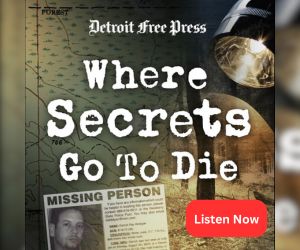By Carol Stiffler
Teen drug use has long been a concern, and it’s a growing problem. Now, a group of local people are raising awareness of what teen drug use looks like, and how family members can get help.
The Hiawatha Sportsman’s Club (HSC) Foundation recently placed a series of four fliers from the Hazelden Betty Ford Foundation around the region, installing them at local schools, churches, and Helen Newberry Joy Hospital. The free materials are placed in public areas where people can feel comfortable picking them up. They cover topics like how to identify drug use, how to get help, and how a family can recover. They are helpful even if the reader doesn’t approach the Hazelden Betty Ford Foundation for assistance.
The fliers should help families with the first step, but the foundation has more in mind. They’ve also scheduled a visit from the “Hidden In Plain Sight” trailer, created by the Chippewa County Sheriff Department and Michigan State University Extension. The trailer is set up as a modern teen bedroom, and visitors who step inside learn how to spot the hidden signs of drug use, and where drugs can be stashed in a room. The trailer will be parked at Engadine Consolidated Schools on April 12 in conjunction with spring parent-teacher conferences.
“It’s a simulation of a kids’ room where there are things the parent could see that suggest the kid or grandkid is doing drugs,” said John MacFarland, a HSC Foundation and coalition member.
They’re also working on a grant to fund gifts of prepaid gas cards for families who will need to travel to bring their child for treatment.
The HSC Foundation has worn their hearts on their sleeves about the matter since a Mackinac County probation officer visited and spoke at one of their meetings. He told members that drug use among teens has seen a “very definite increase,” MacFarland said.
In response, the HSC Foundation formed a coalition called the Eastern Upper Peninsula Youth Disorder Initiative and launched the multi-pronged effort.
HSC Foundation Chair Dick Pershinske said the group is eager to help make this difference. Their attempts to help families identify the problem and begin a path to recovery has become a passion.
The HSC is also working on a Superior Watershed plan and a massive recycling initiative.
“This is probably one of the finest groups I’ve ever had the privilege and honor of working with,” Pershinske said. “There’s no such thing as ‘It can’t happen, no.’ We’ll figure out a way.”
MacFarland, a retired special education teacher, has seen firsthand the devastating effects of drug use in the homes of his students.
He’s concerned about how drug manufacturers are slipping fentanyl into substances to make them cheaper to produce, and it’s leading to an increase of overdoses.
“I don’t know why more young people are being involved in it,” MacFarland said. “But the reason is not to find out why…it’s what should you do about it?”
If a family suspects drugs are a problem and don’t know what to do about it, Pershinske recommends talking to John Swangler, Ph.D., director of behavioral health at Helen Newberry Joy Hospital. Or talk to their school’s superintendent, who can point parents in the right direction.
The free materials haven’t been out long enough for MacFarland or Pershinske to hear if they’ve had any sort of impact yet.
“At least it’s out there,” Pershinkse said.












